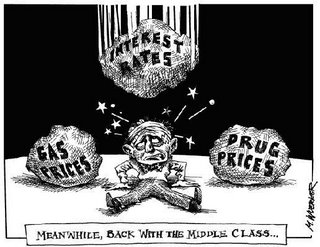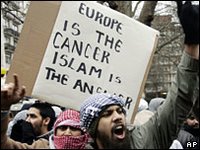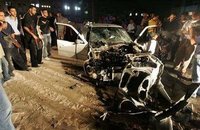Republicans Get Selective In Backing Bush Agenda
GOP Members Focused On Surviving Elections
By Peter Baker
Washington Post Staff Writer
Sunday, June 25, 2006; Page A01
With elections barely four months away and their majorities at risk, Republicans on Capitol Hill say they are making calculations based on survival, not loyalty. President Bush has convinced them that sticking with him on Iraq and casting critics as soft on terrorism is a winning strategy despite public unease. But he has failed to convince them that his approach to immigration is good politics.
The result may be a third election campaign in a row focused on national security, yet it also may mean a second year in a row for the president without a signature victory in domestic policy. Just as Bush invested much of 2005 in pushing a Social Security plan that went nowhere, he has thrown his weight in 2006 behind an immigration proposal that increasingly appears doomed for the year.
The president's failure to bring along conservative allies on immigration tracks his continued weakness in opinion polls. Despite a modest rebound in approval ratings in recent weeks, many in his party see Bush as a drag in their districts, particularly on the border issue. At the same time, they agree with White House strategists that distancing themselves from Bush on the war would throw away a proven trump card -- the argument that the GOP is strong on security and Democrats are not -- just as U.S. forces have killed al-Qaeda's leader in Iraq.
"Republicans feel politically that we have a window of opportunity to reestablish support for the war, or at least reduce the opposition," said Rep. Peter T. King (R-N.Y.). "Democrats are going to throw it at us anyway, so at least now we can fight it on our terms." As for immigration, "our polling shows that it's definitely to our advantage to oppose" the bill favored by Bush.
Although congressional Republicans strongly backed Bush throughout his first term, they face their own political imperatives now, while his name presumably will never be on a ballot again. Joe Gaylord, who was chief adviser to then-House Speaker Newt Gingrich (R-Ga.), called it "the every-man-for-himself feeling that comes in the sixth year" of a presidency.
"Five years of overwhelming support is kind of loosening in the sixth-year, second-term election," he said. "There is wide separation on where we are right now. Everyone hopes for the White House to get its political antenna back up and working. But the guys who are up this fall are scared as hell."
Bush has been working hard to repair the rift with congressional Republicans, exposed perhaps most virulently during the spring confrontation over a Dubai company's plans to take over management of several U.S. ports. And many Republicans say he has met with some success. But with their individual fates on the line, the relationship only means so much.
"I actually think it's better now than it has been, particularly post-Dubai when the criticism was great," said Candida Wolff, the White House legislative director. "I think we're now at a more comfortable position. But members are focused on the election, not necessarily focused on what we want. They're focused on, 'What do I need for the election immediately?' "
After the collapse of his Social Security plan last year, Bush and his staff recognized that his influence on Capitol Hill was tapering. Except for immigration, he laid out a modest domestic agenda for this year, focused mainly on enhancing U.S. competitiveness, finding alternative energy sources and expanding health-care tax breaks. He appears on track to winning approval for many of those proposals, although most of them are spending items that are unlikely to be passed until after the election.
Even in these low-controversy areas, though, Bush will not get all he wants. On competitiveness, lawmakers support boosting research funding, but have balked at making the business research and development tax credit permanent, instead favoring just a two-year extension. His plan to expand health savings accounts looks likely to pass the House but not the Senate.
Likewise, Bush's request for line-item veto authority to trim individual spending projects and a proposal cutting the estate tax for wealthy families both passed the House this week, yet face an uphill fight in the Senate. Just to get this far, sponsors had to scale back the estate tax bill, cutting the levy rather than eliminating it outright.
In another move defying Bush, House Republicans this week rebelled against extending the Voting Rights Act. And five months after his State of the Union address, Bush has been unable to simply create a bipartisan commission to explore ways of solving Social Security and Medicare fiscal problems, nor is any commission likely before the election.
Bush has had some victories he can plug on the campaign trail. He signed legislation extending many of his first-term tax cuts and, in perhaps a more important test of his political muscle, he stared down Congress when it tried to pack a special spending bill for war and hurricane relief with billions of dollars of unrelated items.
Yet those may not move the electorate. "I would argue they don't have any significant accomplishment that is going to really redound with voters," said Steve Elmendorf, who was chief of staff to then-House Minority Leader Richard A. Gephardt (D-Mo.). "They have a list of things they tout off, but I don't think most of them have resonance with voters in swing districts."
Once considered dismissive of the legislative branch, Bush in recent months has assiduously courted Republican leaders with private briefings and plied backbenchers at White House cocktail parties. New White House Chief of Staff Joshua B. Bolten has devoted much time to wooing disenchanted Hill allies.
Rep. Mark Foley (R-Fla.), who has fought the White House on immigration and other issues, said he has noticed a distinct change since Bolten took over in April. Before, Foley said, "there was a bunker mentality, a hunkering-down." He found himself screened by aides, unable to reach the president. "I thought, 'What am I filtering through you for?' " he recalled.
Now, Foley said, he is no longer filtered. Bolten invited him and other Republican lawmakers to his West Wing office recently just to talk, with no special agenda. And Bush invited him as part of another group to the White House residence. "He said, 'Let me show you the Lincoln Bedroom, let me show you my private office,' " Foley said. "It was almost like he was a docent. Here was a new Bush, more comfortable, more relaxed, frank in the discussion of the topics of the day."
King, who led the fight against Bush on the Dubai port deal, has seen the same change. After telling House Republican leaders that he was undecided or leaning against voting for the line-item veto, King received a telephone call from Bush on Thursday as the president was flying aboard Air Force One back from a European trip. "That's never happened before," said King, who ended up voting for the bill.
But none of that means Republicans will bend to Bush's will if they decide electoral odds tilt the other way. "I think members feel we're communicating more effectively," Wolff said. "Does that mean it's easy to get things through? No. It's a tough political environment and a tough political situation, and these are complex issues."






































